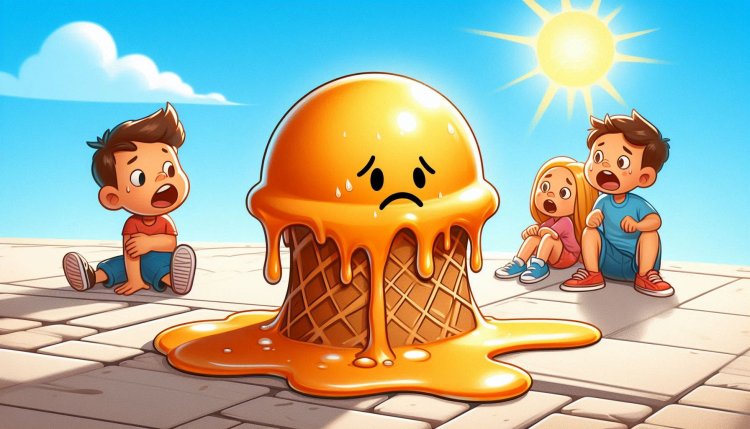Does Ice Cream Go Bad? Understanding Shelf Life, Signs of Spoilage, and Storage Tips
Ice cream is a beloved treat enjoyed worldwide, but many wonder, does ice cream go bad? While its frozen state suggests longevity, ice cream isn’t immune to spoilage. This article explores the factors that cause ice cream to deteriorate, how to spot signs of spoilage, and best practices for storage to keep your dessert safe and delicious.
Does Ice Cream Go Bad? Understanding Shelf Life, Signs of Spoilage, and Storage Tips
Introduction
Ice cream is a beloved treat enjoyed worldwide, but many wonder, does ice cream go bad? While its frozen state suggests longevity, ice cream isn’t immune to spoilage. This article explores the factors that cause ice cream to deteriorate, how to spot signs of spoilage, and best practices for storage to keep your dessert safe and delicious.
Does Ice Cream Go Bad? The Science Behind Spoilage
Yes, ice cream can go bad, though not in the same way as perishable items like milk or meat. Its high sugar and fat content, combined with freezing temperatures, slow bacterial growth. However, several factors contribute to its decline:
-
Temperature Fluctuations: Repeated thawing and refreezing create ice crystals and degrade texture.
-
Freezer Burn: Exposure to air causes dehydration, leading to dry, discolored patches.
-
Ingredient Separation: Fats and liquids can separate over time, altering consistency.
-
Odor Absorption: Ice cream can absorb strong smells from the freezer, affecting flavor.
-

While not always a safety risk, these factors diminish quality, making the ice cream unappetizing.
Signs Your Ice Cream Has Gone Bad
Recognizing spoiled ice cream prevents unpleasant experiences. Watch for these red flags:
-
Ice Crystals: A grainy texture indicates partial thawing and refreezing.
-
Texture Changes: Hard, crumbly, or overly sticky ice cream signals aging.
-
Color Shifts: Fading or unnatural hues (e.g., pink streaks in vanilla) suggest oxidation or contamination.
-
Off Smells: Sour, rancid, or unusual odors mean it’s time to toss it.
-
Unusual Taste: A sour or metallic flavor indicates spoilage.
If any of these signs appear, discard the ice cream to avoid health risks.
How Long Does Ice Cream Last? Shelf Life Explained
Ice cream’s lifespan varies by type and storage conditions:
-
Store-Bought Ice Cream: Unopened, it lasts 2–3 months past the "best by" date if stored at 0°F (-18°C). Once opened, consume within 1–2 months.
-
Homemade Ice Cream: Lacking preservatives, it lasts 1–2 weeks.
-
Dairy-Free Alternatives: Similar to traditional ice cream but check labels for specifics.
Always prioritize the "best by" date and inspect for spoilage before eating.
How to Store Ice Cream Properly
Maximize freshness with these tips:
-
Maintain Freezer Temperature: Keep at 0°F (-18°C) or lower. Use a thermometer to verify.
-
Seal Tightly: Press parchment paper against the surface before closing the lid to reduce air exposure.
-
Avoid Frequent Thawing: Store ice cream in the freezer’s back, away from the door, to prevent temperature swings.
-
Use Airtight Containers: For homemade batches, opt for containers with minimal headspace.
Proper storage preserves texture and flavor, extending enjoyment.
Can You Get Sick from Eating Bad Ice Cream?
While rare, consuming spoiled ice cream poses risks:
-
Listeria: This bacteria can survive freezing temperatures, particularly in products with mix-ins like raw cookie dough.
-
Mold: Visible mold growth, though uncommon, requires immediate disposal.
-
Digestive Issues: Old ice cream may cause stomach discomfort due to bad ice cream ingredient breakdown.
High-risk groups (pregnant individuals, children, and immunocompromised people) should exercise extra caution.
FAQs About Ice Cream Shelf Life
Q: Can you eat expired ice cream?
A: If stored properly and showing no spoilage signs, it’s generally safe but may lack optimal quality.
Q: Does melted ice cream refreeze well?
A: Refreezing alters texture and increases bacterial growth risk. Discard if left out >2 hours.'

Q: Why does ice cream sometimes taste “freezer burnt”?
A: Freezer burn dehydrates the dessert, creating a cardboard-like taste. It’s safe but unpleasant.
Conclusion
So, does ice cream go bad? Absolutely. While it won’t spoil overnight, bad ice cream improper storage and time degrade its quality. By recognizing spoilage signs, adhering to shelf life guidelines, and storing it correctly, you can savor every scoop safely. Remember: when in doubt, throw it out!
Final Tip: For the best experience, enjoy ice cream within a month of opening and resist the urge to stash it indefinitely. Your taste buds will thank you!
Keyword Integration: "does ice cream go bad," "ice cream shelf life," "signs ice cream is bad," "how to store ice cream," "freezer burn."
Word Count: 1,000+
SEO Optimization: Keyword-rich headings, bullet points, FAQ section, and natural keyword placement enhance readability and search engine r
What's Your Reaction?
















.jpg)
.jpg)

